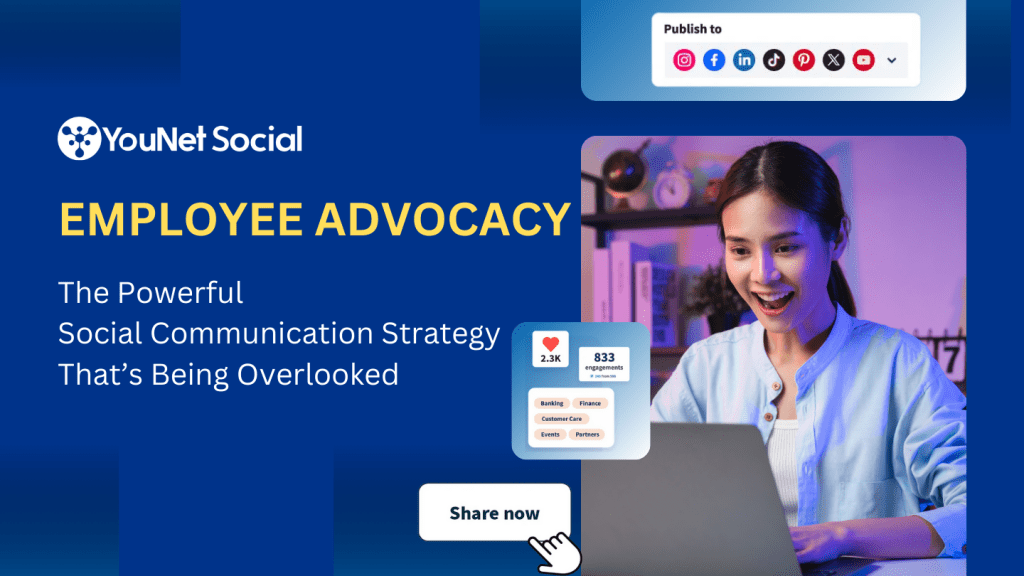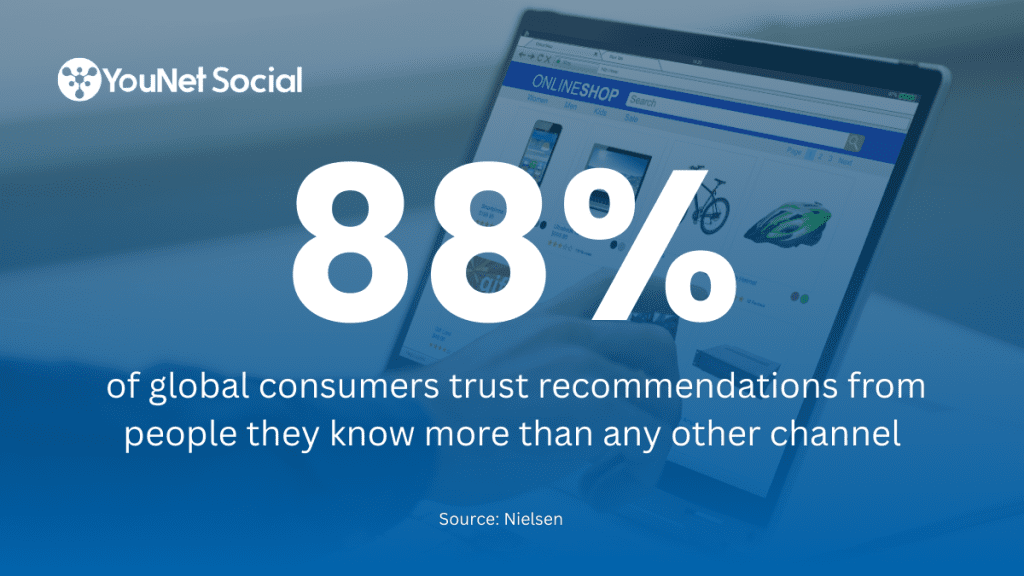

Today’s consumers are smarter and more aware than ever. They can quickly tell if a post feels like an ad—and most of the time, they’ll just skip it. That means regular brand content isn’t enough anymore to truly connect with people.
That’s why forward-thinking marketers are shifting their focus. It’s not just about creating valuable, relevant content—it’s about how and who delivers it. The real challenge now lies in distributing your brand message in the most authentic, non-intrusive way possible. And this is exactly where Social Employee Advocacy steps in as a game-changing strategy that many brands are still overlooking.
The Social Communication Power of Employees
When it comes to expanding brand visibility and cost-effectively reaching the right audience, many companies overlook one of their most powerful and untapped assets—their employees.
According to Cisco, content shared by employees gets 8 times more engagement than content shared directly from a brand’s official page. That’s not just a small boost—it’s a game changer.
Let’s put that into perspective: If your company has 100 employees, and each has just 200 Facebook followers and 100 Instagram followers, your potential reach through employee-shared content could hit 30,000 views—without a single ad dollar spent. That’s the kind of organic reach, but here’s the catch: motivating employees to share company content consistently is easier said than done. Without the right tools and strategy, most companies struggle to turn this potential into real impact.
It’s no surprise, then, that global leaders like IBM, Microsoft, Dell, and Deloitte are embracing structured Employee Advocacy programs. These initiatives turn employees into credible brand ambassadors, helping brands reach wider audiences with authenticity—and without sounding like a sales pitch.
In short, if you’re looking to scale brand awareness and build trust without burning your marketing budget, Employee Advocacy might just be your smartest move yet.
What Is Employee Advocacy?
Employee Advocacy is a strategic approach that empowers your workforce to become credible, authentic voices for your brand—especially across digital and social platforms.
Rather than relying solely on branded channels, companies today are turning to their own people to amplify messages, build trust, and connect with audiences more personally. It’s not about scripted promotion—it’s about giving employees the tools that make it easy (and natural) to speak proudly about where they work.
A well-executed Employee Advocacy program often includes:
- A centralized content hub to curate ready-to-share materials
- Simple sharing workflows integrated into employees’ daily tools
- Performance dashboards to track reach and engagement
- Recognition programs to reward active participation
In this model, employees become:
- Amplifiers – sharing news, content, and culture moments with authenticity
- Connectors – bridging your brand with their real-life communities
- Ambassadors – reinforcing your values and culture from the inside out
3. Employee Advocacy Matters More Than Ever in the Social Media Era


Social media has completely transformed the way brands communicate—and more importantly, who audiences listen to. In today’s digital age, trust is the real currency, and consumers trust people more than they trust logos.
With audiences overwhelmed by ads and branded content that often gets scrolled past, what actually breaks through the noise? Authentic voices—the kind that come from real people inside your organization.
That’s why more businesses are embracing employee advocacy as a core part of their social media strategy. It’s not just about boosting posts; it’s about turning employees into trusted storytellers who can expand brand reach and humanize the message.
To support this shift, specialized Employee Advocacy platforms have emerged, combining advanced tools with intuitive user experiences. Platforms like EveryoneSocial, Sociabble follow a simple yet powerful formula: centralize content, engage your team, and measure impact.
Here’s how it works:
All brand content is gathered in one dashboard. Employees can log in, see what’s ready to share, and with just a click, amplify the brand’s voice across their personal networks—without the hassle.
To make it even more engaging, gamification features encourage friendly competition. Run campaigns, give shout-outs, and reward top contributors—turning social sharing into a fun, team-driven initiative.
And with real-time analytics, marketers get visibility into what’s working, allowing them to optimize strategies and prove ROI to leadership.
4. Why Businesses Should Embrace Employee Advocacy in 2025
In today’s digital landscape, brand trust is everything—but it’s becoming harder than ever to earn. Audiences are bombarded with branded content daily, and most of it barely registers. What actually cuts through the noise? People. Real people. That’s why 2025 is shaping up to be a turning point. As AI-generated content floods timelines and ad fatigue grows, authentic human voices will stand out even more.
According to Edelman’s Trust Barometer, people are far more likely to trust content shared by individuals—such as employees or peers—than official brand communications. This insight highlights a powerful truth: your employees aren’t just part of your team—they’re your most trusted storytellers. When empowered with the right tools, they can humanize your brand in a way corporate messaging simply can’t.
Here’s why now is the perfect time to embrace Employee Advocacy
1. Expanding Brand Reach and Frequency
As mentioned earlier, Employee Advocacy encourages and empowers your workforce to actively and consistently share positive messages about the brand across their personal channels. This not only significantly enhances your brand’s visibility but also opens up new sales opportunities through your employees’ extended networks.
2. Strengthening Brand Trust
According to Nielsen’s 2021 Trust in Advertising Study, 88% of global respondents trust recommendations from people they know more than any other channel, highlighting the growing importance of word-of-mouth and peer influence in consumer decision-making.


Trust has become a key factor shaping consumer attitudes and buying behaviors. By incorporating Employee Advocacy into your internal culture, businesses can turn employees into credible voices for the brand on social media. This human touch brings authenticity to your messaging and boosts its credibility, ultimately increasing how often and how widely your brand is discovered.
Notably, employee-driven conversations about a brand or product are up to 24 times more likely to be shared than traditional branded content. This creates more organic and sustained engagement with your target audience.
3. Boosting Employee Engagement & Improving Recruitment Quality
Beyond amplifying marketing efforts, Employee Advocacy also delivers real value in recruitment and internal engagement. It helps strengthen the emotional connection between employees and company values, while enhancing the employer brand.
According to a report by Altimeter & LinkedIn on Relationship Economics, employees at companies with a strong social media presence tend to feel more satisfied and connected to their workplace. As a result, they are more likely to share positive company updates on their personal channels.
A study by Inside Careers also found that job seekers often look for trustworthy sources before applying to a company. They tend to rely on input from people they know or from experienced professionals who have first-hand knowledge of the organization.
By implementing Employee Advocacy, businesses can create authentic touchpoints on social media through their own team—making it easier to attract high-quality talent and build a stronger employer brand in the process.
4. Cost-Effective Marketing & Brand Promotion
Compared to traditional marketing strategies, employee advocacy allows businesses to cut costs significantly by leveraging the communication power of social media. Instead of pouring resources into paid media, brands can amplify their message through employees—at little to no extra cost.
Focusing efforts on social media also improves visibility among potential customers, especially as social platforms continue to dominate how consumers discover and engage with brands. In fact, a report by JD Power reveals that 70% of customers consider social media the key channel for researching and connecting with companies and products.
Empower Your Team. Strengthen Your Brand.
At YouNet Social, we understand the growing importance of turning employees into trusted brand advocates. With deep experience in building social platforms, we can help businesses embrace Employee Advocacy as a strategic advantage—not just a trend.
If you are looking to build a more trusted, human-centered brand, let’s connect with us today!




